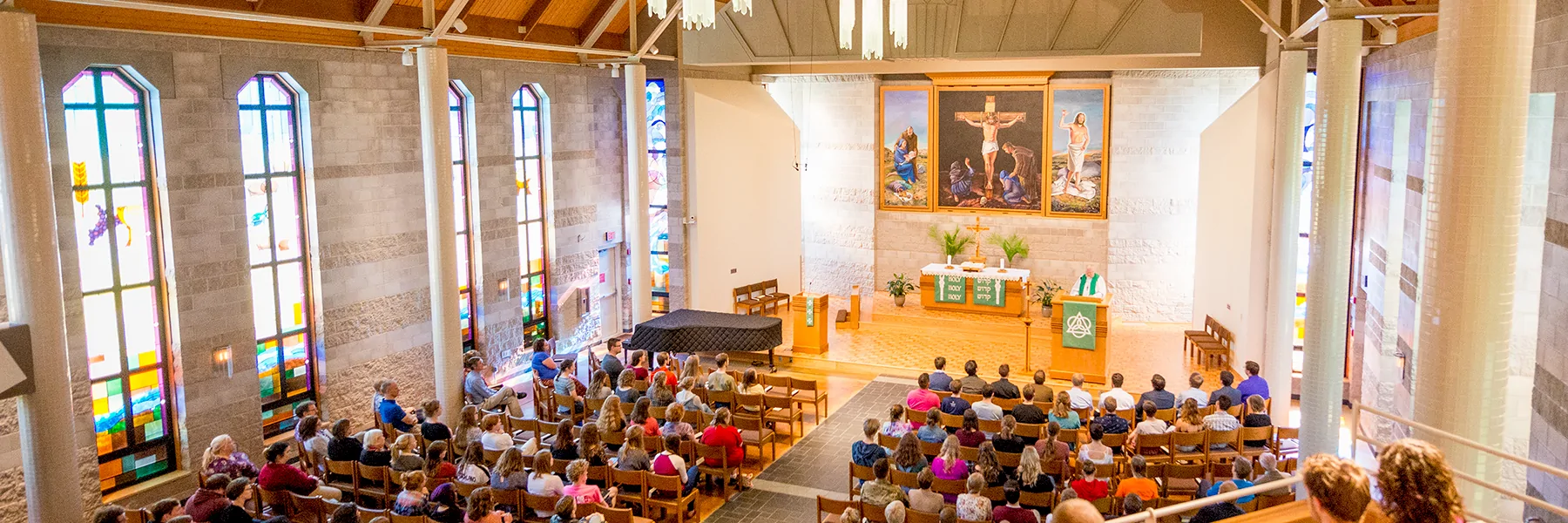Listen
Order of Service
- Prelude
- The Versicles
- The Life of Jon Hus
- Lesson: Revelation 6:9-11
- Devotion
- Hymn 42, God We Praise You
- Kyrie, Lord's Pr, Collect...
- Postlude
John Hus (which means "goose) was born in Bohemia (Czech Republic) during a time of reform in the church. His mother vowed her son would be a priest. In time, Hus entered the priesthood simply to make a good living and for the prestige it might bring (reasons he would later regret). While studying theology in Prague he was drawn to the writings of an earlier reformer, John Wycliff from England, which launched him into a deeper study of the Scriptures. Here the Holy Spirit led him away from a materialistic lifestyle and toward the work of reform. He wrote, "When the Lord gave me this know-ledge of the Scriptures, I abandoned this type of life."
Hus lived in a time when the church of Rome was especially full of turmoil and trouble. Bohemian seminary students were sent to Oxford, England to study for the ministry under those who favored the teachings of Wycliff. In 1391 a new church was built in Prague to further spread this theology. Eleven years later Jon Hus would be called to fill this important pulpit. He preached in the common Czech language of the people, and taught the them to sing the liturgy, which was unusual in that day.
John Hus became known as a powerful orator. Based upon the Scriptures, and the early church fathers, his sermons began to sharply criticize the crass immorality of church lead-ers. He directed hearers to follow the Word of Christ rather than the false teachings added by church councils and popes. A new Arch-bishop was installed in Prague, who was ordered to ban all of Wycliff's writings, and stamp out any attempts to reform the church. In 1411 the Pope issued a new indulgence to help finance a crusade, declaring that anyone who participated would be given full pardon of all sins. Hus and others reacted to the decree with rage from their pulpits. He wrote, "Did Paul grant indulgences? Certainly not! Nor did he beg from the churches in order to cast large bells or build enormous churches, but he begged for the sake of priests who preached the Lord's Word. He did not grant indulgences… but declared, cording to Scripture, what God wished to grant."
Church leadership was outraged, and forced the local king to declare such sermons and teachings that challenged Rome illegal. Three teenagers violated the order, and were brought to be beheaded. Hus pleaded for their lives, but to no avail. Excommunicated by Rome, he was forced to flee from the city and go into hiding, where he remained for two years.
Friends convinced him to come out of seclusion in order to challenge his excomm-unication, under a promise of safe passage. Church authorities turned on him and imprisoned him. His health deteriorated as he hung from a wall by chains. Other followers were also incarcerated. In 1415 he was given a chance to take back his teachings. He responded: "I fear to do so, lest I be a liar in the sight of the Lord, and also lest I offend my own conscience and the truth of God."
In a public ceremony Hus was stripped of his clerical clothing. A cardboard paper hat was placed on his head with the image of three devils. He was lead to the central square of the city to be executed. Hundreds of his followers gathered, but were unable to protect him. Many began singing psalms to encourage him. He was tied to a large pole, facing west, away from the Holy Land. He declined one last request to recant his teachings.
The city marshal clapped his hands, and two large cartloads of straw were ignited beneath him. Hus was heard singing, "Christ, Thou living Son of God, Have mercy upon me."
The crowd encircled the burning fire, and began to sing the words of the Te Deum in order to bolster their beloved pastor in his faith as the flames consumed him. As the flames subsided, church officials pulverized all his bones with clubs, and dumped his ashes in the Rhine River, so no one could preserve them.
On that fateful day, while being taken to his execution, Hus had declared, "Today you roast this goose, but someday from these ashes will rise a swan." The very bishop who officiated his death was later buried in front of the altar in a mona-stery chapel in Erfurt, Germany. It would end up being the same altar where a young monk, Martin Luther, would lie in the form of a cross for his ordination to the priesthood in 1507.
In 1519, during his famous debate at Leipzig, Dr. Luther was charged with being a "Hussite," which he initially denied. Later in the debate, when he had a chance to read some of John Hus' writings, he returned to the podium and stated, "Among the articles of John Hus, I find many which are plainly Christian and evangelical, which the universal church cannot condemn."
Scripture
Revelation 6:9-11 When He opened the fifth seal, I saw under the altar the souls of those who had been slain for the word of God and for the testimony which they held. And they cried with a loud voice, saying, "How long, O Lord, holy and true, until You judge and avenge our blood on those who dwell on the earth?" Then a white robe was given to each of them; and it was said to them that they should rest a little while longer, until both the number of their fellow servants and their brethren, who would be killed as they were, was completed.

